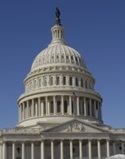
On December 7, Congress passed a stopgap continuing resolution (CR) that will keep the government funded through December 22. There is a laundry list of funding issues that Congress has not yet addressed, and there is a possibility for the need of another CR into January should negotiations fail to yield tangible legislation to finish out Fiscal Year (FY) 2018.
As mentioned in last month’s update, Congress needs to approve spending levels for military and domestic spending, which are set to automatically decrease for FY 2018 under sequestration. Additionally, in exchange for their support on spending bills, Democrats are demanding:
- The reauthorization of the Children’s Health Insurance Program (CHIP) that provides domestic health care to 9 million children and 370,000 pregnant women per year
- A permanent fix for “Dreamers,” who are undocumented immigrants that came to the U.S. as young children
- Increased disaster relief funding for the aftermath of the hurricanes in Texas and Florida, and the wildfires in California. A portion of the disaster relief funding in areas recovering from hurricanes would address vector and infectious disease control, such as mosquito abatement and environmental health recovery activities.
Congress also continues to work on a tax reform package. The House passed its tax plan on November 16, while the Senate passed their bill in the early hours of December 2. The two chambers now go to a conference committee to resolve their differences. As you may have seen in a recent ASTMH action alert, the House tax bill would have a particularly negative impact on graduate students and future researchers by changing tuition waivers for graduate students to be counted as taxable income.
A nomination hearing for President Trump’s likely new Secretary of Health and Human Services (HHS) nominee, Alex Azar, was held on November 29 by the Senate Health, Education, Labor and Pensions (HELP) Committee. During the HELP hearing, Mr. Azar spoke about the need for emergency health preparedness efforts within HHS, specifically, “the benefit of heaving predictable funding.” During the hearing, Sen. Johnny Isakson (R-GA) also spoke positively about CDC, asking Mr. Azar to commit to continuing to advocate for CDC and its funding, particularly as it relates to preparedness efforts. A full committee vote is expected the week of December 19. After the HELP vote, Mr. Azar’s nomination will be taken up by the Senate Finance Committee. Although no date has been set yet for the Finance Committee hearing, reports indicate a hearing will take place before the end of the month.